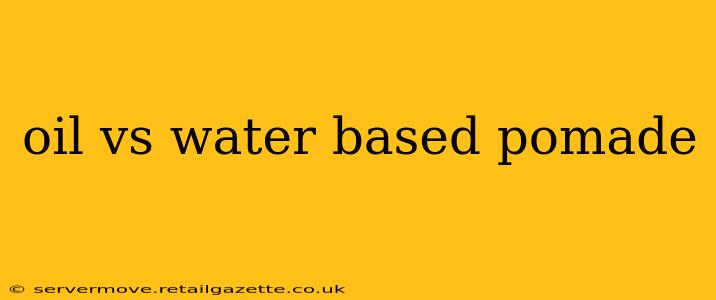Choosing the right pomade can significantly impact your hairstyle and overall hair health. The two main categories are oil-based and water-based pomades, each with its own distinct advantages and disadvantages. This comprehensive guide will delve into the key differences, helping you determine which type best suits your needs and hair type.
What is Oil-Based Pomade?
Oil-based pomades are traditionally formulated with petroleum, mineral oil, or other oils as their base. This gives them a distinct, heavier feel and a strong hold that lasts all day. They are known for their ability to create high-shine, slicked-back styles, and they often leave a noticeable residue.
Advantages of Oil-Based Pomade:
- Strong Hold: Oil-based pomades offer exceptional hold, perfect for styles requiring strong structure and all-day durability.
- High Shine: They deliver a noticeable, glossy shine, ideal for classic, polished looks.
- Long-Lasting: Their staying power is unmatched; they often remain in place even through sweat and activity.
- Buildable: You can layer them to achieve a progressively stronger hold and shine.
Disadvantages of Oil-Based Pomade:
- Difficult to Wash Out: Requires multiple washes with a clarifying shampoo to remove completely.
- Heavy Feel: Can leave hair feeling greasy or weighed down, especially for those with fine or thin hair.
- Residue Buildup: Frequent use can lead to product buildup on the scalp and hair.
- Not Ideal for All Hair Types: Best suited for thicker, coarser hair types; can be too heavy for fine or thin hair.
What is Water-Based Pomade?
Water-based pomades use water as their primary base, often incorporating polymers and other ingredients to provide hold and shine. They offer a lighter feel and are generally easier to wash out than oil-based versions.
Advantages of Water-Based Pomade:
- Easy to Wash Out: Washes out easily with a single shampoo, eliminating residue buildup.
- Lighter Feel: Doesn't weigh down the hair as much as oil-based pomades, making it suitable for most hair types.
- Less Greasy: Produces less shine and a less greasy feel than oil-based pomades.
- More Versatile: Offers a range of holds, from light to medium, catering to different styling needs.
Disadvantages of Water-Based Pomade:
- Less Hold: Generally provides less hold than oil-based pomades, especially in humid conditions.
- Less Shine: Offers a more natural-looking shine, which may not be suitable for styles requiring a high-gloss finish.
- May Not Last All Day: The hold may weaken throughout the day, requiring restyling.
Which Pomade is Right for Me?
The best pomade for you depends on several factors, including your hair type, desired style, and personal preferences.
Hair Type Considerations:
- Thick, Coarse Hair: Oil-based pomades may be a good choice for their strong hold and shine.
- Fine, Thin Hair: Water-based pomades are generally preferred for their lighter feel and easier washout.
- Medium Hair: Both types can work, depending on the desired hold and shine.
Styling Needs:
- High-Shine, Slicked-Back Styles: Oil-based pomades are ideal.
- Natural, Less Defined Styles: Water-based pomades offer more versatility.
How to Apply Pomade:
Regardless of the type, applying pomade correctly is crucial. Start with clean, damp hair for better control. Use a small amount, working it through your hair from roots to ends. Style as desired. For oil-based pomades, consider using a pre-shampoo treatment to facilitate removal.
What are the ingredients in oil-based and water-based pomades?
Oil-based pomades typically contain petroleum, mineral oil, or other oils as their main ingredient, alongside waxes and fragrances. Water-based pomades usually have water as the primary base, with added polymers, resins, and other styling agents to achieve hold and shine. Always check the ingredient list on the product label.
Can I use oil-based and water-based pomades together?
While generally not recommended, mixing oil-based and water-based pomades might be possible in some instances but often results in a less predictable hold and shine. It's best to choose one type and stick with it for consistent results.
Are there any health concerns associated with using oil-based or water-based pomades?
Generally, both types are safe for use. However, some individuals might experience allergic reactions to certain ingredients. Always perform a patch test before applying a new product to your entire head. Additionally, excessive buildup from oil-based pomades may lead to scalp irritation for some.
By understanding the differences between oil-based and water-based pomades, you can make an informed decision that enhances your hair's appearance and health. Remember to choose the product that best fits your hair type and styling preferences.
